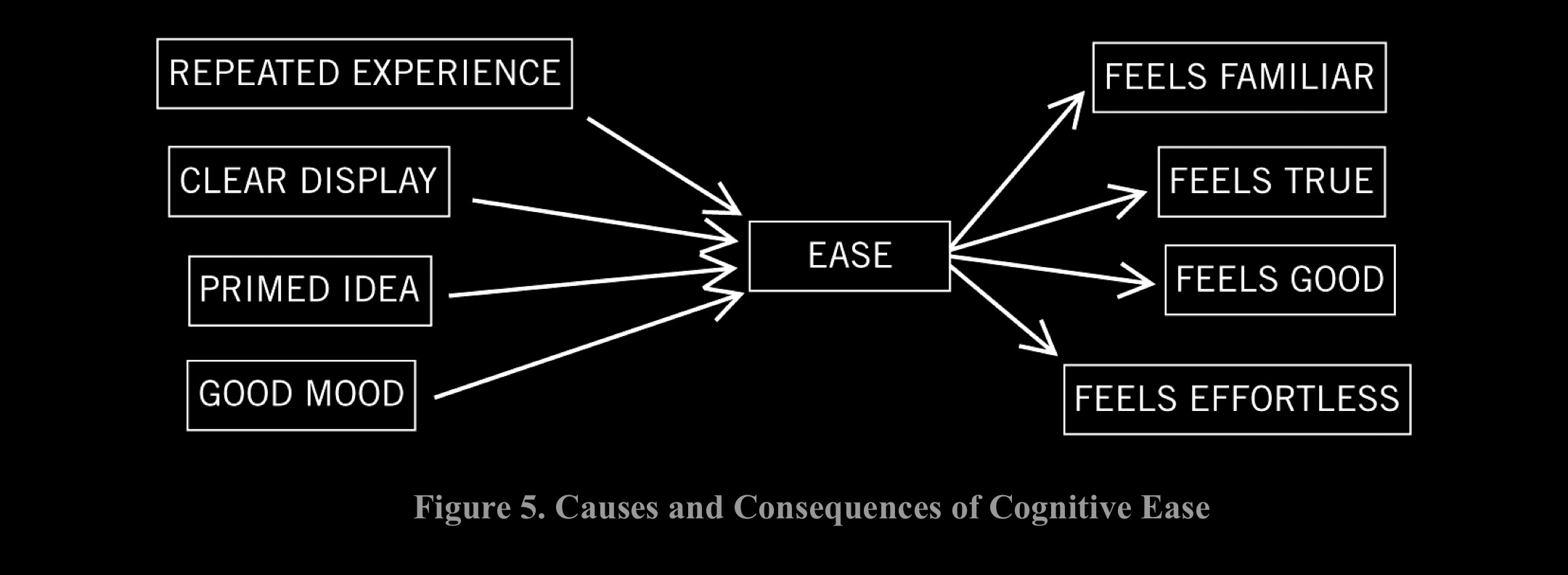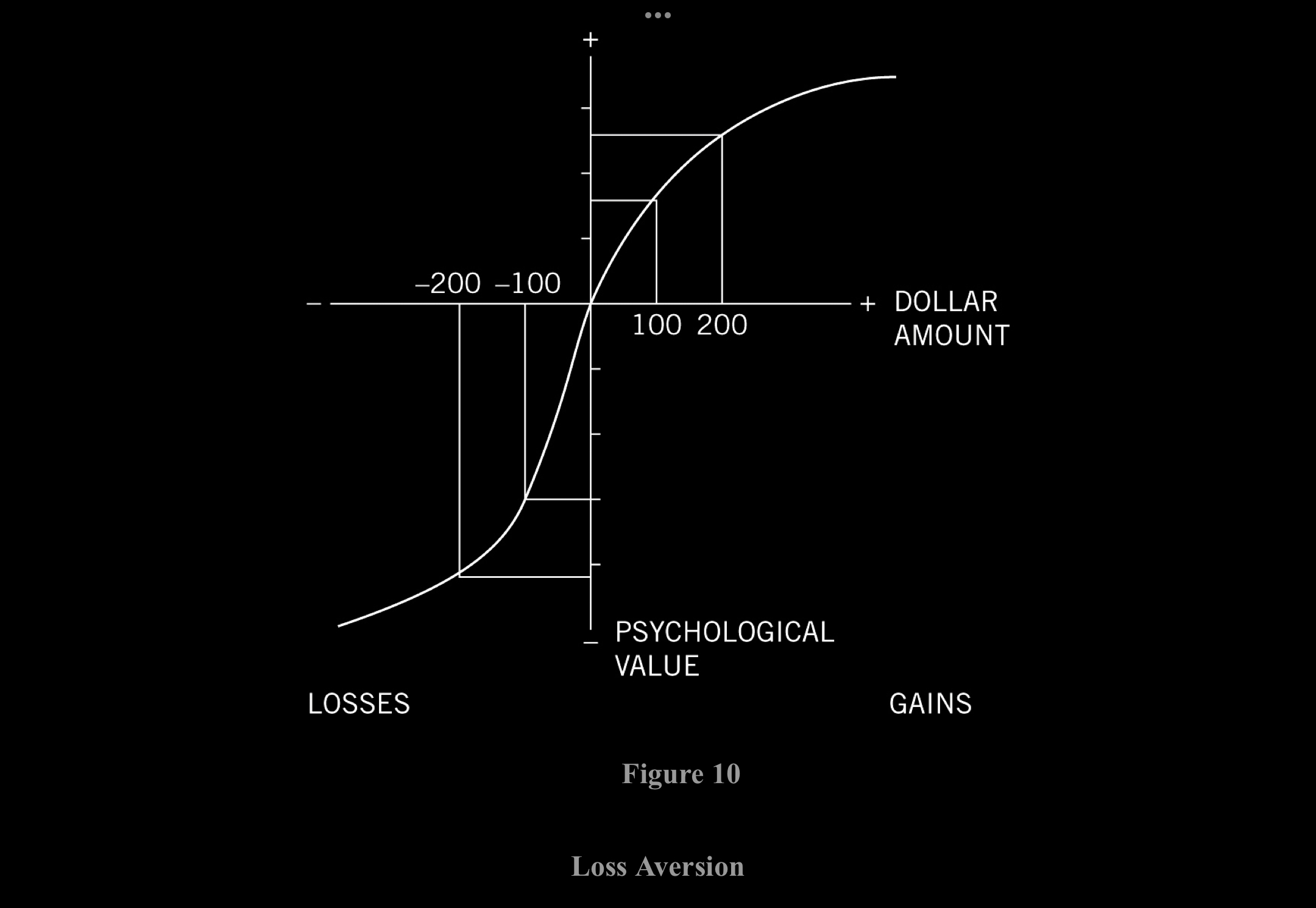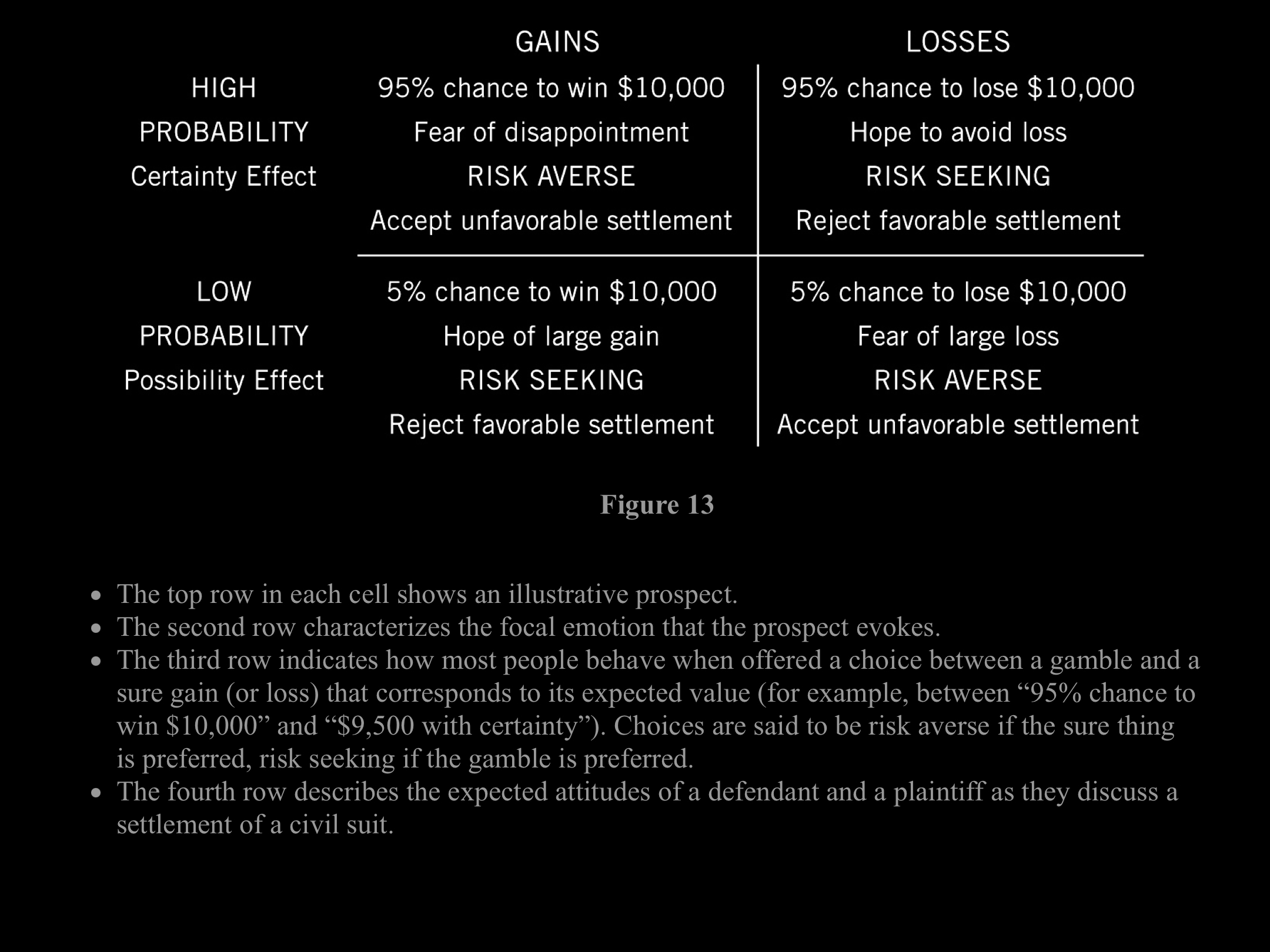Thinking Fast and Slow
Daniel Kahneman 2011
What you see is all there is (WYSIATI)
- Part 1 - Two Systems
- Part 2 - Heuristics and Biases
- Part 3 - Overconfidence
- Part 4 - Choices
- Part 5 - Two Selves
Part 1 - Two Systems
-
System 1 - operates automatically and quickly, with little or no effort and no sense of voluntary control.
-
System 2 - allocates attention to the effortful mental activities that demand it, including complex computations. The operations of System 2 are often associated with the subjective experience of agency, choice, and concentration.
-
Attention can be moved away from an unwanted focus, primarily by focusing intently on another target
-
As you become skilled in a task, its demand for energy diminishes
-
Cognitive work is not always aversive, and people sometimes expend considerable effort for long periods of time without having to exert willpower
-
Flow - a state of effortless concentration so deep they lose sense of time, themselves, and their problems. Separates two forms of effort
- concentration on the task
- deliberate control of attention
-
In a state of Flow, maintaining focused attention on these absorbing activities requires no exertion of self-control, thereby freeing resources to be directed to the task at hand
-
Studies have shown that people who are simultaneously challenged by a demanding cognitive task and by a temptation are more likely to yield to the temptation
-
System 1 has more influence on behavior when System 2 is busy, and it has a sweet tooth
-
If you have to force yourself to do something, you are less willing or less able to exert self-control when the next challenge comes around - ego depletion
-
Activities that impose high demands on System 2 require self-control, and the exertion of self-control is depleting and unpleasant
-
When you are actively involved in difficult cognitive reasoning or engaged in a task that requires self-control, your blood glucose level drops
-
You think with your body, not only with your brain
-
ideomotor effect - the influencing of an action by the idea
-
“Act calm and kind regardless of how you feel”
-
Words that you have seen before become easier to see again - you can identify them better than other words when they are shown very briefly or masked by noise
-
greater cognitive ease gives an impression of familiarity

-
What you see is all there is (WYSIATI)
-
An essential design feature of the associative machine is that it represents only activated ideas
Part 2 - Heuristics and Biases
-
Random processes produce many sequences that convince people that the process is not random after all
-
The hot hand(being hot in basketball) is a massive and widespread cognitive illusion
-
People’s judgments were influenced by an obviously uninformative number
-
Our expectations about the frequency of events are distorted by the prevalence and emotional intensity of the messages to which we are exposed
-
Diagnosticity - The value of information gained from an interaction, feedback or event by a person seeking self-knowledge.
-
Bayes’s rule specifies how prior beliefs should be combined with the diagnosticity of the evidence, the degree to which it favors the hypothesis over the alternative
- base rates matter even in the presence of the evidence about the case at hand
- intuitive impressions of the diagnosticity of evidence are often exaggerates
-
When you specify a possible event in greater detail you can only lower its probability.
-
Adding details to scenarios makes them more persuasive, but less likely to come true
-
Subjects’ unwillingness to deduce the particular from the general was matched only by their willingness to infer the general from the particular
-
Compelling causal statistics will not change long-held beliefs or beliefs rooted in personal experience. On the other hand, surprising individual cases have a powerful impact and are a more effective tool for teaching psychology because the incongruity must be resolved and embedded in a causal story.
-
poor performance is typically followed by improvement and good performance by deterioration, without any help from either praise or punishment
Part 3 - Overconfidence
-
The ultimate test of an explanation is whether it would have made the event predictable in advance
-
Asked to reconstruct their former beliefs, people retrieve their current ones instead - an instance of substitution - and many cannot believe that they ever felt differently
-
A few lucky gambles can crown a reckless leader with a halo of prescience and boldness
-
The idea that the future is unpredictable is undermined every day by the ease with which the past is explained, hard to suppress the intuition of what makes sense in hindsight today was predictable yesterday
-
We reach the point of diminishing marginal predictive returns for knowledge disconcertingly quickly
-
Experts try to be clever, think outside the box, and consider complex combinations of features in making their predictions. Complexity may work in the odd case, but more often than not it reduces validity.
-
The situation has provided a cue; this cue has given the expert access to information stored in memory, and the information provides the answer. Intuition is nothing more and nothing less than recognition.
-
Learned fears are even more easily acquired
-
Two basic conditions for acquiring a skill
- an environment that is sufficiently regular to be predictable
- an opportunity to learn these regularities through prolonged practice
-
intuition cannot be trusted in the absence of stable regularities in the environment
-
Whether professionals have a chance to develop intuitive expertise depends essentially on the quality and speed of feedback, as well as on sufficient opportunity to practice
-
Because optimistic bias can be both a blessing and a risk, you should be both happy and wary if you are temperamentally optimistic
-
If you were allowed one wish for your child, seriously consider wishing him or her optimism. Optimists are normally cheerful and happy, and therefore popular, they are resilient in adapting to failures and hardships, their chance of clinical depression are reduced, their immune system is stronger, they take better care of their health, they feel healthier than others and are in fact likely to live longer
-
An unbiased appreciation of uncertainty is a cornerstone of rationality - but it is not what people and organizations want
-
There is evidence that risk takers in the economic domain have an unusual appetite for gambles on high stakes; they are merely less aware of risks than more timid people are.
-
premortem - a managerial strategy in which a project team imagines that a project or organization has failed, and then works backward to determine what potentially could lead to the failure of the project or organization.
Part 4 - Choices
-
A principle of diminishing sensitivity applies to both sensory dimensions and the evaluation of changes of wealth
-
loss aversion - when directly compared or weighted against each other, losses loom larger than gains

-
You can measure the extent of your aversion to losses by asking yourself a question: What is the smallest gain that I need to balance an equal chance to lose $100? For many people the answer is about $200, twice as much as the loss. The “loss aversion ratio” has been estimated in several experiments and is usually in the rang of 1.5 to 2.5
-
If he owns it, he considers the pain of giving up the bottle. If he does not own it, he considers the pleasure of getting the bottle. The values were unequal because of loss aversion: giving up a bottle of nice wine is more painful than getting an equally good bottle is pleasurable.
-
The fundamental ideas of prospect theory are that reference points exist, and that losses loom larger than corresponding gains
-
Overweighting of small probabilities increases the attractiveness of both gambles and insurance policies.

-
The anxiety of the second situation appears to be more salient than the hope in the first
-
When an unlikely event becomes the focus of attention, we will assign it much more weight than its probability deserves
-
people attach values to gains and losses rather than to wealth, and the decision weights that they assign to outcomes and different from probabilities

-
Entrepreneurs and the investors who evaluate their prospects are prone both to overestimate their chances and to overweight their estimates
-
denominator neglect - the focus on the number of times a target event has happened (e.g., the number of treated and non treated patients who die) without considering the overall number of opportunities for it to happen (e.g., the overall number of treated and non treated patients)
-
The evidence suggests the hypothesis that focal attention and salience contribute to both the overestimation of unlikely events and the overweighting of unlikely outcomes
-
Closely following daily fluctuations is a losing proposition, because the pain of the frequent small losses exceeds the pleasure of the equally frequent gains. Once a quarter is enough, and may be more than enough for individual investors
-
Intense regret is what you experience when you can most easily imagine yourself doing something other than what you did
-
If you can remember when things go badly that you considered the possibility of regret carefully before deciding, you are likely to experience less of it.
-
You should not put too much weight on regret; even if you have some, it will hurt less than you now think.
-
people will more readily forgo a discount than pay a surcharge. The two may be economically equivalent, but they are not emotionally equivalent
Part 5 - Two Selves
-
A story is about significant events and memorable moments, not about time passing
-
Nothing in life is as important as you think it is when you are thinking about it
-
Adaptation to a new situation, whether good or bad, consists in large part of thinking less and less about it